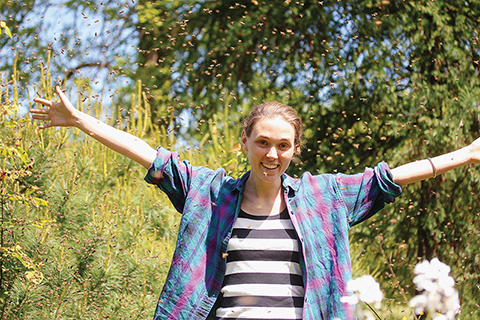In 2009, Gurushabd Khalsa (BA 2011 UC) got a bee in her bonnet about urban beekeeping while completing a work-study placement for her international relations and environmental policy degree. With four other students, she established the University of Toronto Beekeeping Education Enthusiast Society (U of T B.E.E.S.). She’s also the founder of Hogtown Honey in Toronto and of India’s first urban beekeeping program. She shares the buzz with Amy Stupavsky.
You caught the bee bug?
I guess I caught it quite badly. I think that if you’re actually keeping bees, you’re a bee fanatic. There’s enough that goes wrong – and you get stung – so if you’re not passionate about it and think it’s the coolest thing ever, you’ll probably stop.
What do you love about beekeeping?
It gives me a way to connect with people on a subject I love, and to open their eyes to the links between them and their natural environment. Bees are magical like that. They open up conversations about the urban environment in a new, powerful way.
Magical?
They’re attuned to what’s happening around them. If you approach a hive and you’re anxious, angry or not mindful, the bees will react in a similar way. They’re more likely to sting you. If you’re calm and attentive, you can establish a beautiful relationship with them. They are also very mysterious. They act as a collective organism, one consciousness. It almost seems as if they don’t have individuality, because everything they do is for the greater good of the entire colony.
Colony collapse disorder is a big issue. It sounds like something out of The Twilight Zone.
There are a lot of things stressing bees out and weakening their immune systems, but in the last few years, the main factors have become a lot clearer. One of the biggest concerns is neonicotinoids, a kind of pesticide chemically similar to nicotine. In Ontario, they’re used on corn and soy crops. They get into the air, and bees pick them up. One of the advantages of urban beekeeping is we are far away from agricultural land so the bees aren’t exposed to neonicotinoids.
Why should people be concerned?
It’s really scary. We rely on bees to pollinate many of the foods that we eat. Food production would be drastically reduced without them, and our current monoculture agricultural system would collapse without honeybees.
What’s the difference between conventional and local honey?
Lots! Big brands can be a mishmash of honey from bee farms all over the world. You get a very generic taste. It’s also pasteurized, which kills the nutrients. I don’t heat up the honey I produce at all, and I don’t use any antibiotics or chemicals. Plus, local honey reflects the flavours of the local flowers. In Toronto, neighbourhood honeys all taste different. In India, they’d harvest mango honey, lychee honey, saffron honey. The best thing I’ve ever tasted is mango honey straight from the hive.
You must hear a lot of bee jokes and puns. What’s your favourite?
They all meld together at this point. Signing emails “Bee well” is the one that’s stuck.
Recent Posts
U of T’s 197th Birthday Quiz
Test your knowledge of all things U of T in honour of the university’s 197th anniversary on March 15!
Are Cold Plunges Good for You?
Research suggests they are, in three ways
Work Has Changed. So Have the Qualities of Good Leadership
Rapid shifts in everything from technology to employee expectations are pressuring leaders to constantly adapt






One Response to “ Buzzing about Bees ”
A really great article, but in an urban setting like Toronto, you can easily find neonicotinoids in your local hardware store. The vet also sells it to you to apply to your dog/pets to prevent infestations. As dangerous a chemical compound that it is, it is easily sold to people who don't even know they are buying it. Most insect sprays and garden pest chemicals are, you guessed it, neonics! And they are placed in the hands of people who know nothing about them. Read the labels and understand what it is your are doing. I lost 10 hives to neonicotinoids last year, so don't take this lightly. If you are in an urban centre like Toronto, please do not use neonicotinoids. The bees are having a hard enough time as it is.